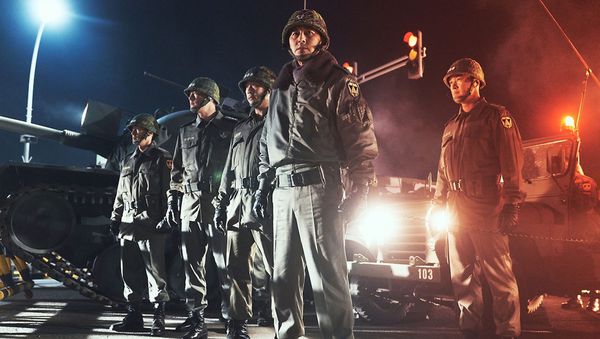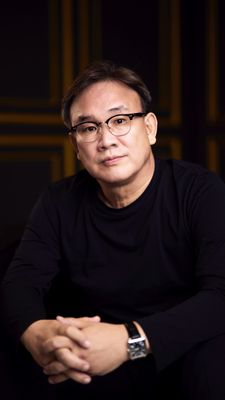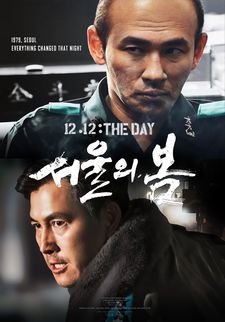 |
| 12.12: The Day |
In the course of a few hours on the 12 December 1979, a coup d’état changed South Korean history. It followed the assassination, six weeks earlier, of president Park Chung Hee, and it would set back democratic progress in the country for over a decade. Now a film depicting the events of those critical hours has been selected as South Korea’s Oscar submission. 12.12: The Day is a taut thriller whose distinctive visual aesthetic owes something to film noir. Its director, Kim Sung Soo, has previously been described as the man who introduced the noir genre to the country, so when we met to discuss the film I asked him if he felt that it was a natural fit for a film on this theme.
 |
| Kim Sung Soo |
“Personally, I am interested in genre film as an action, then a crime thriller. But I didn't choose this film because of what I liked,” he tells me, with the help of a translator. “What happened was the producer who made this film prepared it for a very long time. We were acquainted. He had mentioned this film about 14 years ago. But I did mention to him that I had actually experienced this incident myself when I was younger, and I guess he remembered that. After planning this for nine years, he gave me the script almost as a present. It all started from the producer remembering that, remembering my own experience and bringing me the script.”
We talk about Woo Min Ho's The Man Standing Next, which covers the run-up to the Park assassination and – though everything looks much cleaner – has some stylistic similarities.
“It's not so much that I am connected to that film, but actually the producer who made The Man Standing Next is the same producer that worked in this film. So I guess that's where the connectivity comes from. That producer is making more films around the era of modern and contemporary Korean history. His name is Kim Won-kuk. He's very focused on Korean modern history.”
The film feels energetic throughout, but many scenes involve groups of men waiting around in rooms. How did he plan out these scenes to make them all feel different and natural but create enough movement to keep up the pace?
“This incident happened a very long time ago, but in such a short time that a lot of people were involved and a lot of things actually happened in multiple places simultaneously. I heard that people were saying that it would be too complicated for the audience to follow all the situation. What I wanted to focus on was that I wanted to make the audience feel like they were one of those people who were at the scene and we were just racing through this incident together, as if they were there. So they could actually feel when there were people making decisions. That's how we actually planned this whole production, so that that would be something the audience would feel. And even the actors we picked, we chose actors who have theatre experience.”
The film is visually striking in part because of the constant haze surrounding everything, and the distinctive nicotine stain changing the colour of walls and furniture.
“These people were actually in power for 13 years, but after 17 or 18 years, they ended up all going to the Supreme Court,” he recalls. “There were lots and lots of materials and records and photos of that era, and when you see them, they were all smoking in those pictures. In Korea at the time, in Seoul especially, it was very smoggy because of the air pollution and all the smog. And the production designer is a rather unique person – a strange person!” He laughs appreciatively. “What he really focused on was the air, to really recreate the air of Seoul at the time. I thought he was being crazy, but we ended up really expressing that smog and the atmosphere of that era, and we were able to use visual effects as well to recreate those colours and the mood of that, the atmosphere. We call him our mad scientist. He looks like that, and he's a real genius.”
 |
| 12.12: The Day poster |
How did he balance historical accuracy with the need to create drama and to keep people engaged all the way through?
“This movie contains a bit of the fiction, but I could say that all the events and all the characters are real. I guess what I really focused on was that I wanted the audience to really enjoy this film and really be engaged with it. And when you see that scene where the private military faction are gathered together, that's the part that we don't have the record of. So that's probably something that I had to add in using my creativity and my imagination. When they were at the court later on, they were saying everything they did was for a good cause when they did it. They were trying to justify themselves. But I thought that, you know, when they were gathered together, they were probably full of their own desires and they were probably anxious and then they were probably worried about what was going to happen. So I guess I could say that that's the part that I added my cinematic interpretation. And when the Korean audience watched this film, they were all wondering, you know, ‘Is this all real?’ Or ‘What part of it is fictional?’ And when they looked into the record of the real incident, they were able to realise that everything was really based on actual events.”
That subject matter, and the tone of the film, has him wondering why it got the Oscar opportunity.
“I'm not sure why this film was chosen as the entry. I mean, this is dealing with a very dark side of history. In Korea, these are people who are very well known to people. So in that sense that is very meaningful, that people are actually watching this birth. But I'm not sure how it will be accepted by the international audience.”
I assure him that a film this striking will make an impression on any audience. We’ll find out if it makes the shortlist on 17 December.





















